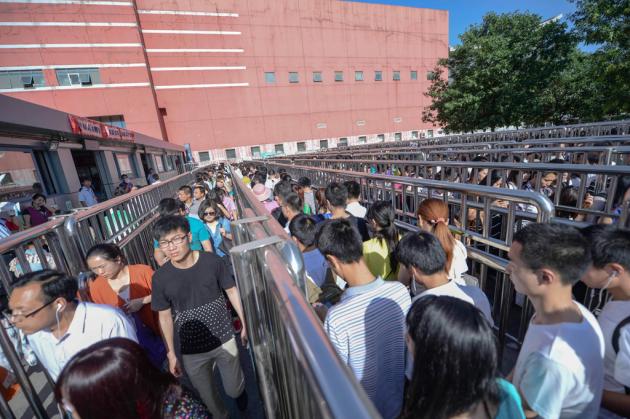Tiananmen protest leader haunted by ghosts, 25 years on

A quarter of a century after Communist authorities crushed the Tiananmen Square demonstrators and their hopes of reform, protest leader Wu'er Kaixi still lies awake at night, haunted by the dead and their unrealised dreams.
Students rallying for democracy and freedom had filled the symbolic heart of Chinese power with euphoria, drawing in workers and intellectuals and inspiring protests around the country.
But after seven weeks in the square their aspirations were abruptly shattered by an overnight military crackdown that ended on June 4, 1989, leaving hundreds of people dead – by some estimates, more than 1,000 – and a ruling party hell-bent on preventing any future such challenges to its power.
“During the time it did seem quite promising that the Chinese authorities may yield, may actually answer to our call for Chinese political reform,” says Wu’er, then a charismatic 21-year-old activist, who became number two on the government’s most-wanted list of student leaders.
“I think at the beginning [of the killings] everybody was in a state of shock. So was I,” he says at a university in Taiwan, his adopted home.
The movement, fuelled by frustration from years of economic upheaval, gathered pace in mid-April as public mourning for the reform-minded former party chief Hu Yaobang morphed into calls for political change and curbs on corruption.
Students began to pour into Tiananmen Square. Thousands later went on hunger strike and eventually erected a Goddess of Democracy resembling New York’s Statue of Liberty facing the portrait of Mao Zedong hanging on the wall of the Forbidden City.
During a meeting between student leaders and politicians broadcast live on state television, Wu’er publicly interrupted the hardline then-premier Li Peng, becoming an overnight celebrity.
“We apply pressure and we are hoping for the regime to make a positive choice,” he says.
“The choice for them was also clear, they could dialogue and by doing so they would certainly be able to maintain a leading position in the Chinese further political development.”
“But instead they decided to take another choice – military crackdown.”
The protests came under the global spotlight as foreign reporters flocked to Beijing to cover a May 15 visit by then-Soviet leader Mikhail Gorbachev – a historic event that was quickly overtaken by domestic turmoil.
China’s Communist leaders were split over how to respond, with moderates led by party general secretary Zhao Ziyang eventually losing.
Zhao last appeared in public on May 19, pleading tearfully on the square for the students to go home before being ousted and confined under house arrest until his death in 2005.
Hardliners, among them China’s supreme leader Deng Xiaoping, took charge, branded the protest a “counter-revolutionary rebellion” and declared martial law.
For two weeks they were unable to take control of the square, until the People’s Liberation Army moved in to clear it on the night of June 3-4 while soldiers flanked by tanks opened fire elsewhere. Fighting broke out with students who defended themselves with sticks and makeshift weapons.
“The bullets flying above your head, that is something you would never have learned in any movies or in any of the literature, until it actually happens in your life,” Wu’er says.
Authorities hunted down protest leaders, imprisoning many even as sympathisers in Hong Kong mobilised to smuggle students out and Western governments offered asylum.
“Wherever I go the people of China supported and helped us, helped me to escape. I managed to go all the way to the border, to the south,” Wu’er says, and supporters in Hong Kong helped him escape.
For years China remained an international pariah hamstrung by sanctions.
But as it has built its economy into the world’s second largest, most other countries have embraced it, with many softening their criticism of rights abuses to avoid upsetting their giant trade partner.
The crackdown remains a strict taboo inside China, erased from textbooks, the media and Internet, leaving younger generations largely unaware of the nature of the momentous event.
In the beginning of his exile Wu’er experienced sadness and misery, he says, “but then of course it’s a situation that we have to endure”.
The dynamic and eloquent activist went on to enjoy a career in finance and a role as a political commentator in Taiwan.
Yet the legacy of Tiananmen still haunts him – failing to see political change in his homeland, surviving when fellow protesters did not, living in exile from his country and family.
He has tried unsuccessfully to return to the mainland to visit his ageing parents, both Uighur intellectuals.
“It’s a sad fact, sad fact for this person, for my family, but it’s also a very sad fact for China.”
He is kept awake by the fact that many of his fellow students and protestors died that night, he says.
“I cannot make peace with the fact that I am in exile, I cannot make peace with the fact that I am being bullied by one of the biggest, most powerful totalitarian regimes.”
“I cannot make peace with the fact that I am a survivor of a massacre, I cannot make peace with that guilt, with that sense of mission.”
RELATED
